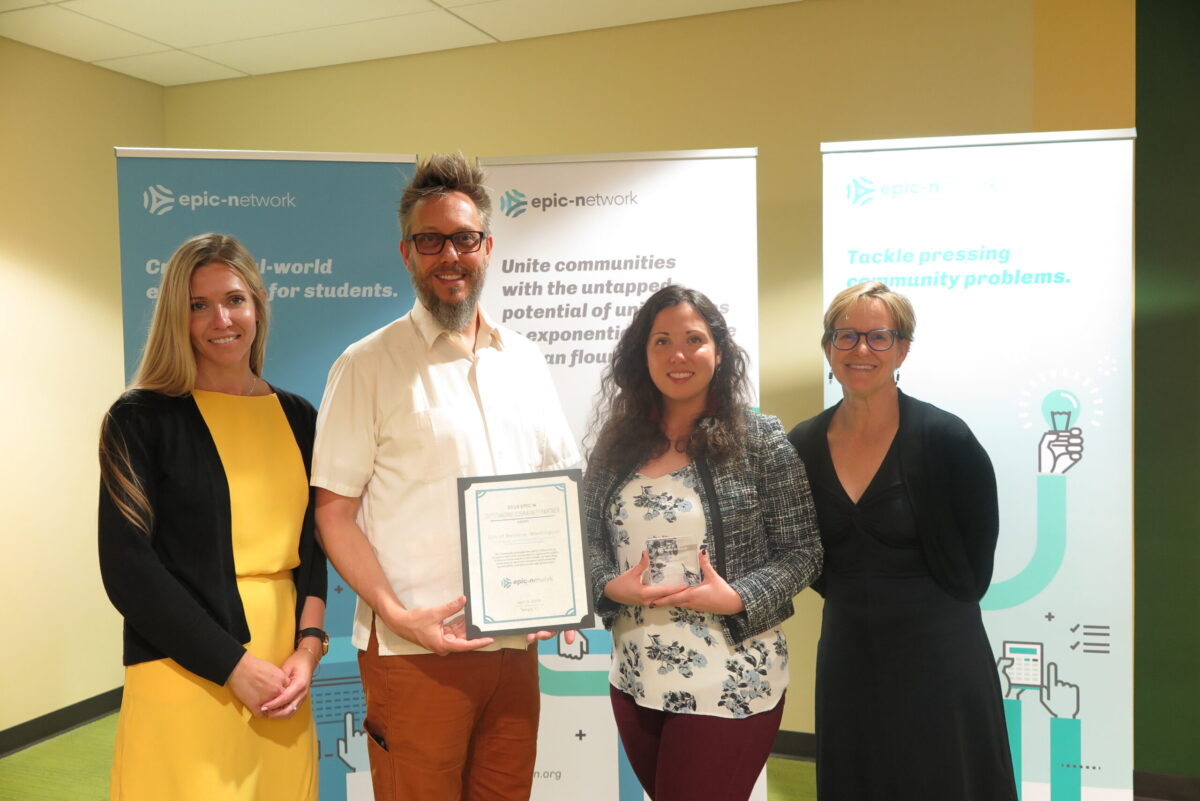Posted on April 11, 2019

In a partnership with the University of Washington expected to generate out-of-the-box solutions to civic challenges, the City of Bellevue has been named Outstanding Community Partner by a national group of universities.
All 31 schools in the Educational Partnerships for Innovation in Communities Network (EPIC-N)are working together with cities to improve livability and sustainability for their communities. EPIC-N honored Bellevue at an awards ceremony Monday for fostering strong community involvement and embracing UW recommendations.
“The City of Bellevue is an absolute example of service-minded innovation,” said Courtney Griesel, an EPIC-N board member. “Their investment and truly authentic and open engagement with the University of Washington is a shining illustration of how EPIC partnerships can inspire and energize both partners, while activating a community. ”
The 30 projects the city and university are working on together include ones proposed or significantly modified by faculty.
The University of Washington Livable City Year program selected Bellevue to be its community partner for the 2018-2019 academic year, following successful partnerships with the cities of Auburn and Tacoma the previous two years.
“This honor is very gratifying,” City Manager Brad Miyake said. “City staff have been impressed with the original ideas and useful data generated by UW professors and students so far. Innovative partnerships like these extend our ability to provide high-quality services for the entire community.”
Livable City Year matches faculty, courses and students across all UW schools, colleges and campuses to best match the projects identified by the city. Through the partnership, city staff are connected to the research and project work at the university.
Since September, the city and university have been collaborating on projects exploring topics ranging from a public/private business incubator and smart buildings to food truck permitting and neighborhood planning. All of the projects advance City Council Vision priorities.
In its nomination for the city, the university cited community engagement that included dozens of residents participating in a question-and-answer session with Health Services students about neighborhood planning. For food truck permitting, Public Health graduate students and city staff compiled best practices and interviewed stakeholders, including food truck operators, other businesses and residents.
As the city considers whether to use unmanned aircraft systems, or drones, it is getting help from UW Law School students, who are evaluating current trends, drafting policy language and recommending public engagement strategies.
The Livable City Year partnership will wind up with a celebration and presentation of student work in the concourse of City Hall on Monday, June 3, 6-8 p.m. The City Council will participate, and the public is encouraged to attend.
About the City of Bellevue
Known as a “City in a Park” with nearly 100 parks and a vast network of trails and greenbelts, Bellevue is the fifth largest city in Washington state. The Eastside city spans 33.5 square miles from Lake Washington to Lake Sammamish. As part of the Innovation Triangle, Bellevue is the high-tech and retail center with a downtown skyline of gleaming high-rises, a diverse population of approximately 140,000 and schools that are consistently rated among the best in the country. To learn more about why Bellevue is the city where you want to be, visit bellevuewa.gov.
About the University of Washington’s Livable City Year program
The Livable City Year program launched in 2016 in collaboration with UW Sustainability and Urban@UW, and with foundational support from the UW College of Built Environments, the Department of Urban Design and Planning, UW Undergraduate Academic Affairs and the Association of Washington Cities. https://www.washington.edu/livable-city-year/